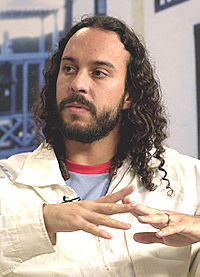
Gabriel, O Pensador
Encyclopedia

Portuguese language
Portuguese is a Romance language that arose in the medieval Kingdom of Galicia, nowadays Galicia and Northern Portugal. The southern part of the Kingdom of Galicia became independent as the County of Portugal in 1095...
for Gabriel the thinker), (born March 4, 1974) is a Brazil
Brazil
Brazil , officially the Federative Republic of Brazil , is the largest country in South America. It is the world's fifth largest country, both by geographical area and by population with over 192 million people...
ian rapper.
Biography
Coming from a unique background among Brazilian rappers, Gabriel, the son of a well known journalist in BrazilBrazil
Brazil , officially the Federative Republic of Brazil , is the largest country in South America. It is the world's fifth largest country, both by geographical area and by population with over 192 million people...
, hit fame in 1992 with the song "Tô Feliz (Matei o Presidente)" ("I'm happy, I've killed the president") the debut single from his first and eponymous album. This song was written in protest of President Fernando Collor de Mello
Fernando Collor de Mello
Fernando Affonso Collor de Mello was the 32nd president of Brazil from 1990 to 1992, when he resigned in a failed attempt to stop his trial of impeachment by the Brazilian Senate...
and his corrupt administration. Interestingly, Gabriel's mother was Collor's press secretary. The same album also yielded other hits, including "Lôrabúrra" ("Dumb Blonde", shortened) and "Retrato de um Playboy" ("Portrait of a Playboy"), bringing hip hop mainstream attention in Brazil by catering to the middle class
Middle class
The middle class is any class of people in the middle of a societal hierarchy. In Weberian socio-economic terms, the middle class is the broad group of people in contemporary society who fall socio-economically between the working class and upper class....
. Although rapping about everyday life, Gabriel also found time to talk about social injustices with his fourth single, "O Resto do Mundo" ("The Leftovers of the World"), a more downbeat track about homeless life, with a purposefully depressive melody and flow. Gabriel was "notorious for his biting attacks on some of the major ills of Brazilian society: poverty, racism, violence."
His following albums were also commercially successful, with a careful blend of socially relevant tracks mixed with airwave-minded pop anthems. His third album, Quebra-Cabeça, was released in 1997 and sold over one million copies. History-minded, Gabriel was highly influenced by other Brazilian music, including bossa nova
Bossa nova
Bossa nova is a style of Brazilian music. Bossa nova acquired a large following in the 1960s, initially consisting of young musicians and college students...
, samba
Samba
Samba is a Brazilian dance and musical genre originating in Bahia and with its roots in Brazil and Africa via the West African slave trade and African religious traditions. It is recognized around the world as a symbol of Brazil and the Brazilian Carnival...
and MPB
Música Popular Brasileira
Música Popular Brasileira or MPB designates a trend in post-Bossa Nova urban popular music. It is not a discrete genre but rather a constellation that combines original songwriting and updated versions of traditional Brazilian urban music styles like samba and samba-canção with contemporary...
, as well as using hip hop's traditional methods of sampling jazz
Jazz
Jazz is a musical style that originated at the beginning of the 20th century in African American communities in the Southern United States. It was born out of a mix of African and European music traditions. From its early development until the present, jazz has incorporated music from 19th and 20th...
, funk
Funk
Funk is a music genre that originated in the mid-late 1960s when African American musicians blended soul music, jazz and R&B into a rhythmic, danceable new form of music. Funk de-emphasizes melody and harmony and brings a strong rhythmic groove of electric bass and drums to the foreground...
and disco
Disco
Disco is a genre of dance music. Disco acts charted high during the mid-1970s, and the genre's popularity peaked during the late 1970s. It had its roots in clubs that catered to African American, gay, psychedelic, and other communities in New York City and Philadelphia during the late 1960s and...
("2345meia78", for example, sampled Chic
Chic (band)
Chic was an African American disco and R&B band that was organized during 1976 by guitarist Nile Rodgers and bassist Bernard Edwards. It is known best for its commercially successful disco songs, including "Dance, Dance, Dance " , "Everybody Dance" , "Le Freak" , "I Want Your Love" , "Good Times"...
's "Good Times").
In 1994, while touring in Portugal, Gabriel's song "Lavagem cerebral" (Brainwashing) was received with much praise. The piece was accepted as "a strong social critique of Brazilian society and of the ideology of the dominating classes."
Besides his native Brazil, Gabriel, o Pensador is also well known in Portugal, Angola, Cape Verde, Mozambique, and has worked with Portuguese musicians like Sérgio Godinho
Sérgio Godinho
Sérgio Godinho, OL is a Portuguese poet, composer, and singer. He was born on August 31, 1945 in Porto, Portugal, and is one of the most influential popular musicians in Portugal...
and General D.
The rapper has also released two books: "Diário Noturno" (Brazil and Portugal; poems and short stories), and "Um garoto chamado Roberto" (Brazil; fiction poetry for children, awarded as best book in its category by the Jabuti Prize
Prêmio Jabuti
The Prêmio Jabuti is the most important and well-known literary award in Brazil. It was created in 1958 by Edgard Cavalheiro....
in 2006).
Discography
- 1993 Gabriel Pensador
- 1995 Ainda é só o Começo
- 1997 Quebra-Cabeça
- 1999 Nádegas a Declarar
- 2001 Seja Você Mesmo, Mas Não Seja Sempre o Mesmo
- 2002 MTV Ao Vivo
- 2005 Cavaleiro Andante

